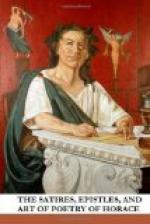NOTES.
Page 6.
Enough: you’ll
think I’ve rifled the scrutore
Of blind Crispinus,
if I prose on more.
Howes has a very similar couplet:—
But hold! you’ll think
I’ve pillaged the scrutore
Of blear Crispinus: not
one word then more!
I believe it however to be a mere coincidence on my part. The word “scrutore” is an uncommon one; but it was the recollection of an altogether different passage which suggested it to me here. At any rate, Howes is not the first who has used it in translating the present lines.
Now ’tis enough: lest you should think
I’ve dipt in blear-eyed Crispin’s ink,
And stolen my work from his scrutore,
I will not add a sentence more.
Smart.
PAGE 9.
Gives Varus’ name to knock-kneed
boys, and dubs
His club-foot youngster Scaurus, king of clubs.
This is, of course, in no sense a translation: it is simply an attempt (a desperate one, I fear) to give point to a sentence which otherwise to an English reader would have no point at all.
PAGE 13.
Heal to your majesty!
yet, ne’ertheless,
Rude boys are pulling
at your beard, I guess.
Those commentators are clearly right who understand “vellunt,” not of what the boys are apt to do, but of what they are actually doing, while the Stoic is talking and making himself out to be a king.
PAGE 17.
Say, you’re first
cousin to that goodly pair,
Caelius and Birrius,
and their foibles share.
Caelius and Birrius were a couple of robbers, a fact distinctly mentioned in the Latin, and, I hope, capable of being inferred from the context of the English.
PAGE 35.
After life’s endless babble they sleep well.
I need hardly refer to the well-known line in Macbeth.
PAGE 44.
Cassius the rake, and Maenius the buffoon.
This is nearly identical with a line in Howes, of which it may very possibly be an unconscious remembrance. Here and in other places I have called Nomentanus, metri gratia, by his family name Cassius, though it is nowhere, I believe, applied to him by Horace. Pantolabus is supposed to be the same as Maenius, whom Horace mentions elsewhere, and I have been only too glad to take the supposition for granted. Generally, where a Horatian personage is known to have had two names, I have used that one which the exigences of the verse recommended.
PAGE 61.
O heaven-abandoned wretch!
is all this care.
O inconsistent wretch!
is all this coil.
Gifford’s
Juvenal, Sat. xiv.




